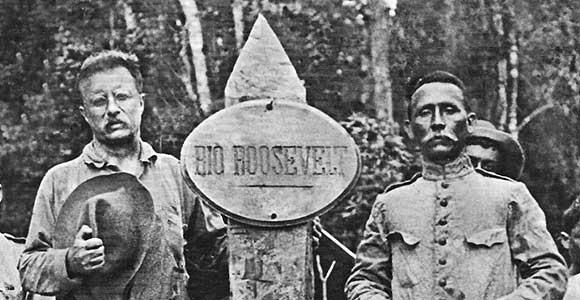In 1913-14 former president Theodore Roosevelt embarked on an exploratory expedition into the Brazilian wilderness. The expedition was beset by serious difficulties and Roosevelt almost died. The literary fruit of this ordeal was Roosevelt’s book Through the Brazilian Wilderness (1914). I am currently reading it and I recommend it highly.
 Chicago Boyz Archive
Chicago Boyz Archive
Walter Russell Mead Calls for a Vision of a Better American Future
The always interesting and often brilliant Walter Russell Mead has a post titled The Right Wrestles with the Inequality Debate. It is mainly an analysis of the disparate views within the political right about income equality. First, he correctly notes that people on the conservative and libertarian side generally don’t object to inequality, to the extent it is earned by people who create value.
by giving free rein to the talents and ambitions of the strongest, we are setting in motion a process which over the long run will make everyone better off. The talented will invent new technologies, discover new drugs, make compelling art and otherwise enhance the general human storehouse through their own unfettered pursuit of happiness. Any heavy handed government efforts to keep the talented from becoming too successful will slow down the pace of innovation and change that historically has seen living standards for average people skyrocket over the last three hundred years. This idea isn’t going away anytime soon and the reality that three hundred years of capitalist development has in fact raised living standards to unprecedented levels in much of the world suggests that there may even be some truth in it.
Mead does not focus on the question of resentment against unearned wealth. Where political connections are the source of wealth, that wealth does not benefit the public or create value. It is zero sum, parasitic.
Mike Lotus at the U.S. Army War College 2014 National Security Strategy Seminar
I had the great good fortune to attend the U.S. Army War College 2014 National Security Strategy Seminar, which ran from June 2-6, 2014.
The War College runs an annual course for colonels and lieutenant colonels, personnel from the other branches, as well as officers from foreign armies. According to the Army War College website the resident class of 2014 included 385 students including: (1) 216 Army officers: Active, Reserve, Guard, (2) 64 Navy, Marine, Air Force and Coast Guard officers, all components, (3) 77 international officers/ fellows, and (4) 28 senior national security civilian professionals.
The final week of the year, civilians are invited to attend the National Security Strategy Seminar, which consists of lectures and participation in seminar discussions. The NSS is very well organized and professionally run.
Mike Lotus Meeting with Emmanuel Todd in Paris, Discussing Todd’s Current Work and America 3.0, UPDATED
As I mentioned in an earlier post, I recently had the great good fortune to make a presentation in Paris to the AFEA (The French Association for American Studies, Association Française d’Études Américaines, at the invitation of Jérôme Noirot, of the Ecole Centrale, Lyon. My presentation was entitled “America 3.0, Decentralization and the Tenth Amendment.” I have just learned paper of that title, coauthored by myself and James C. Bennett, will be included (in English) in a book to be published later this year. There may also be opportunities for future travel to France, which would be excellent.
While I was in Paris, I had the opportunity to meet with Emmanuel Todd, whose work was fundamental to the analysis we applied to American life, past present and future, in America 3.0. Our entire discussion in the book is highly “Toddean” as we understood it. (Our other major influence is the work of Alan Macfarlane.) Specifically, we base our understanding of American culture in large measure on Todd’s description of the Absolute Nuclear Family (ANF), which is the main Anglo-American family type.
I wrote to Todd last Fall, to ask him if he wanted a copy of the America 3.0. He told me he already had it, and planned to read it. However, over six months had gone by and I had heard nothing. Of course, my worry was that we had in some way misapplied or misunderstood his methodology. When I confirmed that I would be traveling to Paris, I contacted him again and asked if we could meet in person, and he agreed.
When we met, at a cafe near where I was staying, Todd stood up, shook my hand, said “bon jour”, sat down and immediately launched into a rapid fire conversation with no preliminary chit chat. (When the waiter asked us what we wanted, I asked for a café crème, and Todd without looking at him, with a dismissive wave said, “deux café crème!” — as if he was saying: Coffee is not important, we have important matters to discuss!) It was clear that Todd is a man of intense intellectual seriousness. It was as if we had been in the midst of a conversation already and were picking it up in the middle, which in a sense we had been, via our books. This reminded me, in a good way, of the intellectually intense atmosphere at the University of Chicago, where I was an undergraduate.




